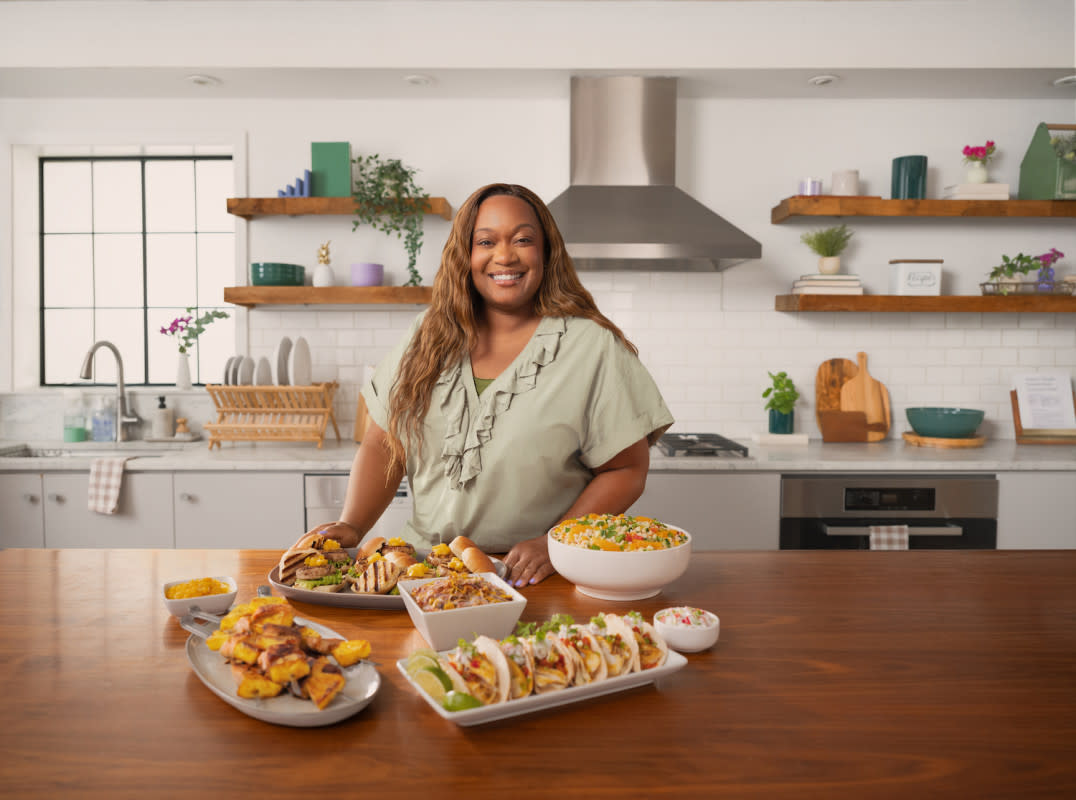Celebrity Chef Sunny Anderson Shares the #1 Thing That Helps When She Has an Ulcerative Colitis Flare-Up

- Oops!Something went wrong.Please try again later.
If you've ever tuned into any of Sunny Anderson's Food Network shows, you know she loves to cook, eat great food and have a good time.
Most people wouldn't suspect that Anderson has been living with ulcerative colitis for nearly 20 years, an inflammatory bowel disease that causes chronic inflammation and ulcers in the lining of the large intestine. Symptoms often include abdominal pain, diarrhea, bloody stool and more.
“I was diagnosed at 19 after about three months or so of symptoms," Anderson tells Parade. "My body was talking to me, but it was kind of like driving a car: You get that 'check engine' light and ignore it for a little bit.”
When she finally got a diagnosis, Anderson had to learn how to manage her condition. Here's what that looked like.
Related: The 18 Best Foods for Gut Health
Getting a Diagnosis
The road to a diagnosis wasn't a straight line. For a while, Anderson chalked her symptoms up to the fact that she had recently moved to Seoul, South Korea. "I was young, I’d moved halfway around the world to Seoul, South Korea, and I told myself it was the changes and the food—that was why my stomach was cramping and why I was getting blood in my stool. I was really making excuses."
After a few months of having those symptoms, though, she talked to her dad, who's a doctor. "After I told him my symptoms he said I needed to talk to a gastroenterologist," she said. "I immediately made an appointment and went through a battery of tests to figure out what was going on. It was scary! It was scary to be 19 and getting a biopsy."
Related: This Is a Common, Lesser-Known of Poor Gut Health
As soon as Anderson was finally diagnosed, which was in 1994, she started learning more about ulcerative colitis so she could figure out how to work with her condition instead of resisting it. Back then, she had to do a lot of reading to understand what this entailed.
Now, in the age of the internet, there's a lot more information out there, and Anderson has teamed up with Pfizer to bring resources and recipes to people living with UC.
"When I was diagnosed it was—as I call it—the analog times. Now I can say 'Go to thisislivingwithuc.com' and there are resources to help you. You can even download an app. It’s different these days."
She says that while it would be nice to be able to give a "prescription" for the types of foods you should or shouldn't eat when living with ulcerative colitis, it's very individualized. Starches work well for her, for example, but might not work as well for someone else. “I want other people to get to this happy place I'm in, but figuring out what works for you starts with talking to the medical professionals."
Related: The Worst Breakfast for Your Gut Lining, According to a GI Doc
The #1 Thing She Does When She Has an Ulcerative Colitis Flare-Up
Anderson has a loud and clear message for anyone living with UC: Let people know you have it, even if it's uncomfortable. That's what she's always done, even back when she was first diagnosed.
"When you have a UC flare-up, there's an urgency to go to the bathroom immediately," she says. "I used to work in radio, and I got very familiar with what the longest songs I could play were—you know, 12-minute songs. But I knew telling other people what was going on was important so when I needed to take a break they could fill in for me."
When people living with ulcerative colitis don't talk about it, they can start feeling really alone. "That’s why I'm so happy to be part of this awareness campaign," Anderson says. "I want people with UC to see someone who has a food career and has no problem telling people about it. Like, here are my symptoms, here’s a place you can go to get more information. Knowledge has always been my weapon."
Additionally, she says, people with UC can start feeling really limited when it comes to socializing or going out because they're worried they'll have a flare-up. "For example, you know how there will be that long line for the women's room at a sporting event or something? I never have a problem saying I have an issue and need to get to the front of the line," Anderson says. "You would be surprised at how compassionate people are when you just tell them what you’re dealing with and what they can do to help."
Next up: The One Thing Colon Cancer Doctors Say You Should Never, Ever Do

